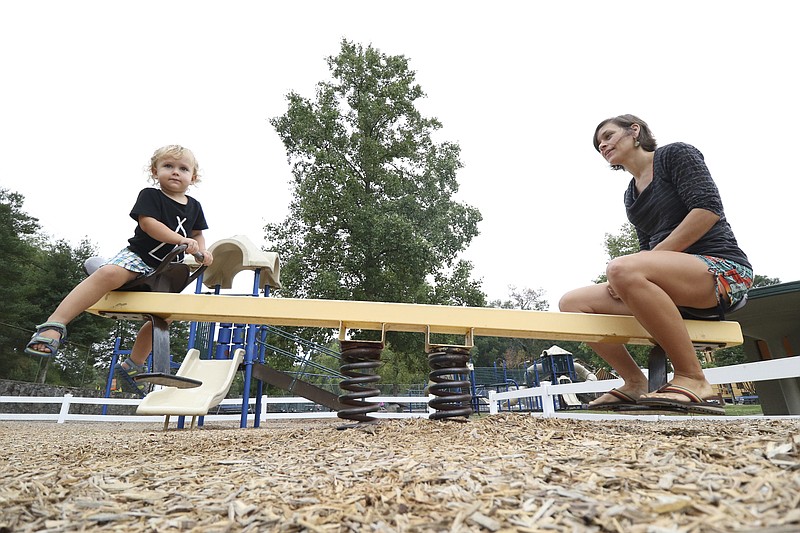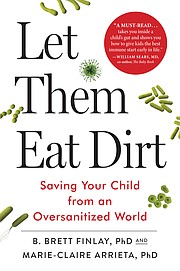Some say
Here are responses about letting kids get dirty from the Times Free Press Facebook page:* “Pretty sure children have been getting filthy for thousands of years. The human race is still here.” — Grant Dye* “Dirt is good for kids. I loved getting dirty or muddy as a child , during the summer, mom would make us wash off with the outside hose before coming in the house. We would come in take a bath and feel as good as new.” — Judy Couch* “Myself and my kids grew up on a dairy farm. We were exposed to more germs than most kids in 20 lifetimes. It makes your immune system stronger.” — Gerald Gallison* “I have [four kids] ages 5, 10, 15 and 17. I’ve always let them run barefoot and gotten as dirty as they wanted. … My kids have hardly ever been sick. For years, [our] only trip to doctor was for checkups.” — Heidi Davis* “If I ever hesitated to go into mud or dirt, my dad made a point of pushing me into it. I’m rarely sick now. I’ve also been vaccinated. Thanks for being a smart, responsible parent, Dad.” — Brandon Reisman* “Kids are supposed to get dirt on the bottom of their feet. It boosts their immune system and tests it out for adulthood. God made dirt, and dirt don’t hurt.” — Maude Fisher
When her kids were little, Heather Kilgore was petrified at the thought of sending them outside.
After all, she thought, just beyond her threshold were throngs of invisible germs just waiting to pounce on them without mercy or hesitation.
"You hear so much about killer virus-this and swine flu-that," says the 41-year-old mother of four. "I felt like whenever they were out of my sight, they would catch something and die."
Inside her Rossville house, she felt some measure of control over her children's exposure to bacteria. By keeping them clean, she thought, she could keep them safe, keep them healthy.
"You have to have the cleanest house because you don't want your kids to catch a super bug," she recalls thinking.
More and more, however, doctors identify getting dirty during childhood as a crucial step in the development of a healthy immune system and the tamping down of future allergies.
Playing outdoors - and yes, getting dirty - is not just crucial for developing muscles and balance or learning to withstand scrapes and bruises, it's also an ideal way to be exposed to many different kinds of helpful bacteria. Having a wide variety of bacteria living in and on the body creates a microbial ecosystem that makes it harder for a single strain to flourish and cause illness, says Dr. Allen Coffman, a pediatrician at Highland Pediatrics in Hixson.
"So-called 'good bacteria' often hold more pathological bacteria in check," Coffman says. "Most immunologist feel that small exposures to many... environmental viruses, bacteria and fungus are important.
"Thus it is best to have a balance on most child surfaces.... Parents should understand that, in keeping a play area clean, they are removing competing organisms. If a rapidly producing, pathogenic organism then is introduced; it may spread rapidly because it is unimpeded by well-established bacteria."
Coffman's sentiments reflect a growing opinion in the medical community and society at large that there is such a thing as "too clean" or, conversely, "not dirty enough."
Respondents to a post on the Times Free Press Facebook page overwhelmingly support the idea of allowing children to get dirty in the interest of promoting an active lifestyle and safeguarding their health.
"I had some of the best times of my life playing in the dirt and mud," writes Ringgold, Ga., resident Miranda Doug Duncan. "It all washes off. Can't keep them in a bubble. Let them be kids!"
Chattanoogan Shannon Moore Edmondson shares Duncan's belief in the brighter side of grime.
"I'm very pro-germ exposure," she writes. "We've been very lucky with avoiding allergies and have only had minor colds in the toddler years. Our pediatrician [Galen North Pediatrics' Dr. Ben Wiley] believes in getting in the dirt and so do we."
On Sept. 20, Workman Publishing released "Let Them Eat Dirt: Saving Your Child From An Oversanitized World" by Dr. B. Brett Finlay and Dr. Marie-Claire Arrieta. The parenting book's co-authors focus on the inherent dangers in over-cleaning children.
In a Sept. 22 interview on National Public Radio, Finlay said parents' obsession with cleanliness and hygiene is in direct contradiction to "a recent explosion of scientific knowledge" indicating that scouring and sanitizing kill off vital bacteria that constitute one of the body's most important safeguards against illness.
"This really hyper-vigilance to sanitation has wiped out a whole microbial generation really," Finlay said. "Our kids are no longer exposed to the [kinds of microbes] that humans have developed with.... Now this has real impact on what we called 'Western society diseases' like asthma, allergies, obesity, diabetes. These all have microbial links."
The inability of anti-bacterial products to distinguish between "good" and "bad" bacteria has caused a pushback that recently reached the upper echelons of government.
On Sept. 2, the U.S. Food and Drug Administration issued a marketing ban on antiseptic wash products containing any of 19 active ingredients, saying manufacturers couldn't demonstrate that they were safe for long-term daily use or more effective than non-antibacterial soap and water in preventing illness and the spread of certain infections.
"In fact, some data suggests that antibacterial ingredients may do more harm than good over the long-term," Dr. Janet Woodcock, director of the FDA's Center for Drug Evaluation and Research, said in a news release announcing the administration's ruling.
Despite evidence suggesting that over-cleaning could lead to weaker immune systems and more resilient microbes, Coffman suggests that some parents whip out their dusters and bleach from fear of being judged by other parents.
"Parental competition and parents' unrealistic expectations of their own parenting performance can view dirty kids as a statement on their own parenting success," he says. "Parents are also swamped with horrific stories of child illness and accidents by social media. It is brutal to watch how judgmental and self-righteous some can be of unpreventable accidents."
For his part, Chattanoogan Dan Landrum says he couldn't care less what other parents or grandparents think about his habit of exploring the wild and dirty places of the world with his grandson, Barrett, 3, and granddaughter Gwen, 10 months.
On any given afternoon, he says, they're as likely to be constructing impregnable - if imaginary - fortresses out of flagstones as contemplating the beauty of a leaf on the trail. If they get a little grimy in the process, he says, what difference does it make?
"Barrett and I have places we go to and they're all dirty," says Landrum, 55. "We wait for it to rain to go to a particular mud puddle.... People talk about a pig in mud, but you ought to see a kid in mud. They're equally happy.
"When we go do things like that, the thing I'm most frightened about is forgetting to take a change of clothes before we get in the car because my wife is going to be unhappy with me."
Despite her early reluctance to unleash her children on the outdoors, Rossville's Kilgore ultimately realized that she owed it to them to loosen the reins and put a cap on her cleaners. She still worries, she says, so her fridge will never host moldy food, if she has anything to say about it, but she's come to appreciate that getting messy isn't such a bad thing.
"As they got a little bit older, I realized you're robbing them of their childhood if you don't let them go play in the dirt and stuff," she says. "Eventually, I realized they would get sick not matter what I did, so I had to let them get outside."
Contact Casey Phillips at cphillips@timesfreepress.com or 423-757-6205. Follow him on Twitter at @PhillipsCTFP.

